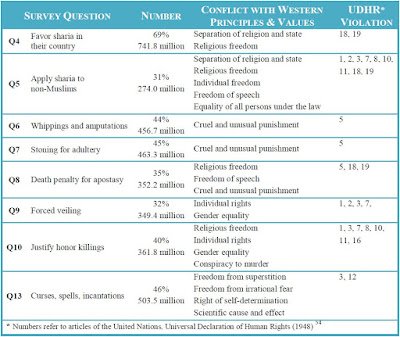
About one-third to one-half of Muslims (274.0 million - 503.5 million) in Muslim majority countries uphold beliefs and practices that are contrary to many Western values and international human rights.
This conclusion is part of my recently published study, "Muslim Beliefs & Practices: A Global Demographic Assessment."* The surveys used to compile the study were conducted by Pew Research (2008 - 2012) and covered 1.1 billion Muslims---two-thirds of the Muslim world. North America and Western Europe were not included.
The study found that though 69% (742 million) of Muslims want to live under sharia, those who support the harsh "hudud" punishments (stoning for adultery, amputation for theft, death for apostasy, etc.) ranged from 35% - 45%. Since these punishments are derived directly from the Quran, hadith, and sunna, support for them undoubtedly comes from Muslims who promote the traditional interpretation of those texts.
 This group, consisting of 41% (369.7 million) of the survey population, believes that their lives faithfully reflect the hadith and the sunna of Muhammad. Statistically, they are not only more likely to promote the hudud punishments, but also to believe that both Islam and sharia have only one interpretation, that sharia should be the law of their country, and that proselytizing is a religious duty.
This group, consisting of 41% (369.7 million) of the survey population, believes that their lives faithfully reflect the hadith and the sunna of Muhammad. Statistically, they are not only more likely to promote the hudud punishments, but also to believe that both Islam and sharia have only one interpretation, that sharia should be the law of their country, and that proselytizing is a religious duty. But more importantly, those who identify as devout Muslims overlap with 64% (581 million) of Muslims who believe that sharia is Allah’s revealed law, rather than a form of law developed by men and based on the word of Allah. For this reason they are more likely than other Muslims to reject the legitimacy of Western laws and government, along with the rights and values they protect.
It is highly implausible, if not naïve, to suggest that devout Muslims shed their deeply held beliefs in sharia when they immigrate to Western countries. Consequently, there is justifiable concern that immigrants from this group will have a strong impulse to resist and even change the host culture. In a 2016 French poll, 29% of Muslims said they rejected the country’s secular laws.
The full 29 page study graphs and analyzes 16 survey questions in detail, providing the historical, theological, political, and social background of Muslim beliefs and practices. It also includes an assessment of security, terrorism, and areas of potential conflict with Western culture.
______________________________________
* The study was first introduced on June 21 by an article in Front Page Magazine.